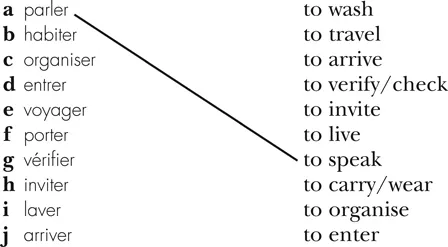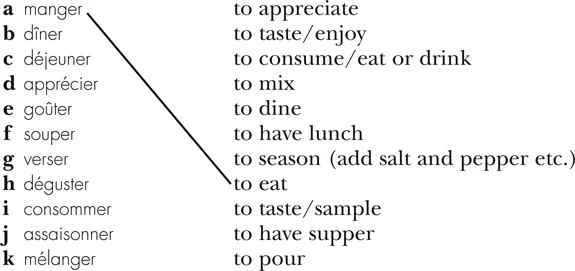
eBook - ePub
French Grammar Made Easy
Rosi McNab
This is a test
Compartir libro
- 204 páginas
- French
- ePUB (apto para móviles)
- Disponible en iOS y Android
eBook - ePub
French Grammar Made Easy
Rosi McNab
Detalles del libro
Vista previa del libro
Índice
Citas
Información del libro
French Grammar Made Easy is the ideal introduction to the basics of French grammar for anyone new to the language or looking to refresh their knowledge.
The Grammar features:
-
- concise and jargon-free explanations supported by examples
-
- exercises throughout to reinforce learning
-
- a "fast-track" option for more advanced learners
-
- a full answer key, making the Grammar ideal for self-study.
French Grammar Made Easy presents the essential patterns and rules of the French language in a clear and accessible manner. It is the ideal Grammar for those wishing to supplement their learning and move beyond the phrasebook level.
Preguntas frecuentes
¿Cómo cancelo mi suscripción?
¿Cómo descargo los libros?
Por el momento, todos nuestros libros ePub adaptables a dispositivos móviles se pueden descargar a través de la aplicación. La mayor parte de nuestros PDF también se puede descargar y ya estamos trabajando para que el resto también sea descargable. Obtén más información aquí.
¿En qué se diferencian los planes de precios?
Ambos planes te permiten acceder por completo a la biblioteca y a todas las funciones de Perlego. Las únicas diferencias son el precio y el período de suscripción: con el plan anual ahorrarás en torno a un 30 % en comparación con 12 meses de un plan mensual.
¿Qué es Perlego?
Somos un servicio de suscripción de libros de texto en línea que te permite acceder a toda una biblioteca en línea por menos de lo que cuesta un libro al mes. Con más de un millón de libros sobre más de 1000 categorías, ¡tenemos todo lo que necesitas! Obtén más información aquí.
¿Perlego ofrece la función de texto a voz?
Busca el símbolo de lectura en voz alta en tu próximo libro para ver si puedes escucharlo. La herramienta de lectura en voz alta lee el texto en voz alta por ti, resaltando el texto a medida que se lee. Puedes pausarla, acelerarla y ralentizarla. Obtén más información aquí.
¿Es French Grammar Made Easy un PDF/ePUB en línea?
Sí, puedes acceder a French Grammar Made Easy de Rosi McNab en formato PDF o ePUB, así como a otros libros populares de Languages & Linguistics y French Language. Tenemos más de un millón de libros disponibles en nuestro catálogo para que explores.
Información
1
VERBS
1.1 Talking about doing things
Why verbs first? Because verbs are so important. They are the ‘glue’ that holds a language together. A noun is just the name of something or someone, it can be singular or plural, but a verb is used to tell [or ask] you something. In many languages verbs are ‘codified’ to tell you who or what is doing it or when it happens. In English we usually stick a lot of verbs together: He was running, I would like, Did you know? … but in French they usually add a different ending to the verb. Il courait, je voudrais, vous saviez?
►► If you know what a verb is, go on to 1.1.1.
You use a verb to talk about what someone or something does, is doing, has done or intends to do. A verb is often called a doing word.
To find out if a word is a verb, ask yourself if it is about doing something.
I Which of these words are things you can do?
- run
- jeans
- sleep
- make
- easy
- eat
- under
- blue
- think
- after
Some words can be used as verbs, nouns or adjectives, e.g. play can be a play at the theatre or part of the verb to play.
Ask: Are they ‘doing’ it? If they are, it is a verb.
II Which of the highlighted words are being used as verbs?
- Jason and Lily run a homework club in the church hall.
- They go for a run every morning.
- They both work at the local school.
- After work they go straight to the hall.
- Tonight they are having a meeting to discuss funding.
- They are meeting in the church hall.
- They need more chairs for the children.
- Jason usually chairs the meetings.
- Lily records the proceedings and types them up.
- The records show that they have met three times this year.
1.1.1 What is the infinitive?
►► If you know what the infinitive is, go on to 1.1.2.
When you look up a verb in a dictionary, you will find the infinitive. This is the ‘name’ of the verb.
In English, the infinitive consists of to + verb, e.g. to read, to buy, to travel.
III Here are some French infinitives. You probably know some of them already or can guess what they mean. See how many you can match up with their English counterparts.
Try to look for similarities between the French and the English. Some are obvious: for example, organiser means to organise. Others are less obvious, such as laver meaning to wash (a lavatory was the place where people used to wash) and porter meaning to carry (a porter was someone who carried something).

IV The verbs in III are usually referred to as ‘-er’ verbs (pronounced E.R.) because they end in -er. Here are some more -er verbs. How many of them do you know already? They all have to do with food and eating.

If you find it difficult to learn new words, try to find a ‘hook’ to hang them on: e.g. manger, a manger where you put the food for an animal. And if you have travelled in France, you will almost certainly have seen signs at places selling wine, saying Dégustation, which means they are inviting you to sample their wines.
More than 50% of English words derive from French words or have the same stem. If you don’t know a verb, try saying the English word with a French accent – you have a 50% chance of being understood!
New words made into verbs are usually -er verbs: e.g. faxer = to fax; surfer = to surf; monopoliser = to monopolise, etc.
V What do you think the French for these verbs would be? Cover up the French and see if you can work it out.
| a to decide... |